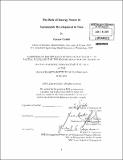The role of energy sector in sustainable development in Iran
Author(s)
Golabi, Zanyar
DownloadFull printable version (22.84Mb)
Other Contributors
Sloan School of Management.
Advisor
Roberto Rigobon.
Terms of use
Metadata
Show full item recordAbstract
Generally speaking, both supply and use of energy in Iran are unsustainable. The unsustainable energy supply and use coupled with an unreliable and unsecure energy system have striking and lasing impacts on economic, social and environmental development of Iran. Natural gas and oil have dominated the total production of energy sources (TPES) in Iran for the past 50 years. Natural gas has also dominated the total final consumption (TFC) since 1999. Other alternative resources have been playing marginal roles in Iran's development. The high share of fossil fuels in energy supply and use has striking social, economic and environmental consequences. Additionally, Iran's reliance on oil and gas resources makes the energy sector in Iran vulnerable and highly unsecure. In order to address these issues, I provide indicators of energy sustainability and analyze the trends of these indicators systematically. These indicators help policy makers as well as public and private sectors get a better understanding of major driving forces that affect energy sustainability, economic prosperity as well as social and environmental well-being. Based on these indicators, I explore the impacts of energy subsidies, innovation policies, technological advancement, renewable energy development, US sanctions, international cooperation, geopolitical instability, and many other factors on Iran's sustainable development. Based on an in depth analysis of current state of energy sector in Iran and the characteristics of a sustainable energy system, I propose strategies and policies that can result in a more sustainable energy sector which in turn contributes to the economic prosperity, social and environmental well-being and higher energy security.
Description
Thesis (S.M.)--Massachusetts Institute of Technology, Sloan School of Management, 2011. Cataloged from PDF version of thesis. Includes bibliographical references (p. 155-158).
Date issued
2011Department
Sloan School of ManagementPublisher
Massachusetts Institute of Technology
Keywords
Sloan School of Management.